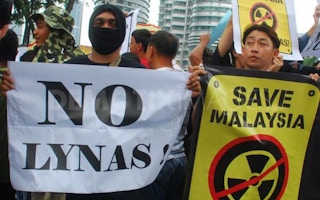Malaysia’s political opposition has vowed to scrap a controversial $200 million rare-earths processing plant being built by Australia’s Lynas Corp if it wins national elections expected to be called within months.
The plant, in Malaysia’s east, aims to weaken China’s monopoly on the global supply of the metals, which are used in a range of products from flat screens to iPhones and energy-efficient light bulbs. It is also backed by Japanese investors keen to see the development of alternative supplies.
“The opposition will put a stop to the plant,” Fuziah Salleh, an opposition member of parliament for Kuantan where the plant is being built, told Reuters on Monday.
“We are very clear about our position with regards to sustainable development. And Lynas is definitely not what we categorize as sustainable development.”
The opposition is backing some residents and green groups which have voiced fears over radioactivity from thorium waste from the plant, though Lynas says this will be extracted and kept in a facility that meets world standards for safe storage.
The opposition is seen as unlikely to win a parliamentary majority in the upcoming elections, but its shock gains four years ago mean a victory is not out of the question.
Its strong stance against the plant adds to uncertainty over the project as Lynas and its investors await a decision by Malaysian authorities as early as Monday on its application for a pre-operating license to begin commissioning the plant.
Malaysia’s Atomic Energy Licensing Board confirmed it was discussing the Lynas case, but its director general, Raja Abdul Aziz Raja Adnan, told Reuters it was not clear if a decision would be announced on Monday.
Government officials said the final decision would likely be made by Prime Minister Najib Razak and his cabinet next week.
The Malaysian plant is to process rare earths mined in Australia at Lynas’ Mount Weld project. The operation is key to breaking China’s grip on the supply of rare earths metals, crucial in several green products such as hybrid cars.
Japan is counting on Lynas to supply 8,500 tonnes a year of rare earths by early 2013 to curb its reliance on China, under a deal involving trading house Sojitz Corp and state-run Japan Oil, Gas and Metals National Corp.
The Japanese came to Lynas’s rescue in 2010 with $325 million in funding after the Australian government balked at approving a Chinese bid for a majority stake in the company.
Lynas has also lined up Germany’s BASF as a customer and has plans to form a joint venture with Siemens AG to make magnets for wind turbines using rare earths products from the Malaysian plant.
Lynas shares rose 1.95 percent to A$1.31 on Monday.
Wary of voters
Opposition leader Anwar Ibrahim has also spoken out against the plant, saying he would scrap it if his disparate three-party alliance wins the election. Protests by local residents during construction of the plant prompted an investigation by the International Atomic Energy Agency (IAEA).
Lynas received a favorable report from the IAEA but was told to provide a long-term waste management and safety plan.
It says that its plant is not comparable at all to a rare-earths plant that was shut by a unit of Mitsubishi Chemicals in Malaysia in 1992, after residents there blamed the plant for birth defects and a high rate of leukemia cases.
Prime Minister Najib wants more foreign investment but is wary of sparking voter anger after his ruling coalition suffered record losses in 2008 polls.
Opposition politician Fuziah said Lynas’ plan for managing the radioactive waste was “shoddy and full of holes.” She said it had yet to identify a permanent disposal site for the waste that would not be a risk to the environment or public health.
“Lynas claims that they are for green technology because rare earths is used in green technology,” Fuziah told Reuters. “There’s nothing green about a rare earth refinery,” she added.

















